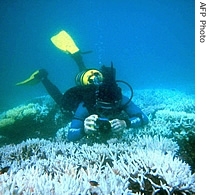11 August 2009
Coral reefs around the world continue to deteriorate despite increased awareness and protective legislation, according to a Washington-based environmental organization.
Half-way through a two-year study, the World Resources Institute (WRI) says the world's reefs are in worse condition than several years ago.
 |
| A researcher photographs bleached coral heads off Queensland, Australia |
Environmental Laws Must Be Enforced
Coral reefs are delicate ecosystems that are threatened by over-fishing, pollution, agricultural runoff and other human activities. And despite laws to curb these activities, WRI says coral reefs continue to deteriorate. "Regulations are often not enforced; either for lack of financial resources, lack of boats or lack of political will,?said Lauretta Burke, a Senior Associate at WRI.
Reefs: Delicate Ecosystems
Coral reefs "are quite delicate ecosystems that thrive in a narrow band
of environmental conditions?said Burke. Temperature, salinity, nutrient levels, PH of the sea water, clarity
and sun light are all factors in where coral can live. They are vital for fisheries, coastal protection, tourism and wildlife.
WRI says greater individual awareness of the issues facing coral reefs can have a positive impact. "We can do things like being aware of the fish we purchase and the fish we eat in restaurants," said Burke.
Tourists can also lend a hand. Burke suggested selecting eco-friendly resorts and using tour operators
sensitive to the environment. She also cautioned swimmers, snorkelers and scuba
divers to refrain from touching or standing on coral.
General estimates show that approximately 10% of the world's coral reefs are already dead. It is also estimated that about 60% of the world's reefs are at risk due to destructive, human-related activities.